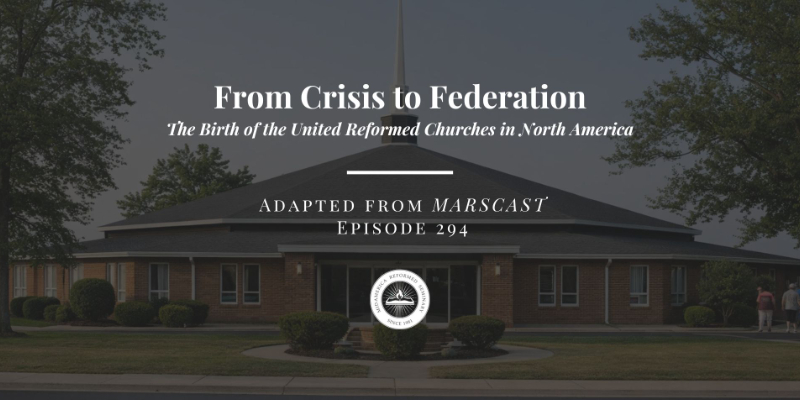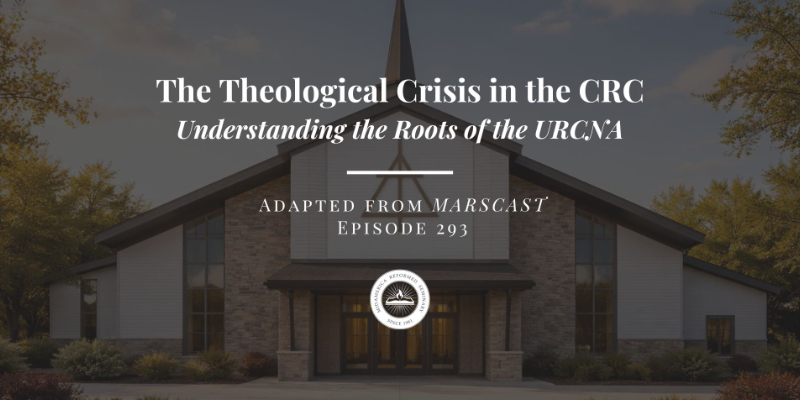
What's Happening to Pastoral Leadership?
This article is adapted from the September 2025 issue of The Messenger, written by Dr. J. Mark Beach
The apostle Peter was a leader—he was a pastoral leader. Yes, he was an apostle, too, but also a presbyter or elder, a co-elder alongside other elders, who, of course, were not apostles (see 1 Pet. 5:1). In Acts 5, Peter presides over what is perhaps the severest case of church discipline we find on the pages of the Bible. I’m referring to the episode with Ananias and Sapphira. This is a sobering, even scary, story.
We read about a notable couple who wanted to make a notable gift to the church. Notable, too, is that they seem to have been driven partly by greed and partly by vainglory. When they sold a piece of property and gave the proceeds of the sale to the church, Peter detected deceit. He accuses them not of miserliness or prideful pretentiousness, the vainglory of devotion masquerading as piety; rather, he faults them for lying to the Holy Spirit (5:3). Their sin was primarily a lying to God, secondarily to the church (5:4). At that, Ananias drops dead—soon his wife, in repeating the lie will suffer the same fate (5:10).
This remarkable incident, as previously noted, is the most severe case of church discipline recorded in Scripture. It stands there as a monument to God’s holiness. It serves not as an exhibit of the normative procedure for church discipline—rebuke followed by the guilty dropping dead. Instead, it serves to show us what happens to sinners who think they can deceive God, not repenting of (but doubling down on) their sin. It illustrates the final outcome for all sinners, under the discipline of God’s Word, who deceive themselves in thinking they can stand righteous before God without true faith in Jesus Christ. It also illustrates the final outcome for all sinners who do not repent. Indeed, it is the final outcome for each of us, except that we repent and find life in the Lord of life. All church discipline, if it does not end in repentance (in seeking God’s mercy), culminates in death.
Our interest here, however, is not church discipline per se, but how Peter exercises leadership in the midst of a most difficult and unpleasant situation. What sort of shepherd would not wish to avoid this affair? Well, of course, this is a divine censure, a warning siren for the whole church. It is uniquely this, to be sure. But it also portrays for us how the chief undershepherd of the church, Peter, a fellow elder with others (a first among equals), exercises leadership — leading the church (in this case, discipline), setting the example in not ignoring a scandal, confronting deception and ungodliness (masquerading as piety), and doing that even if it costs the church future financial advantage. The particular case is clear enough: truth-telling must be protected, fake piety must be exposed, even if it means a decrease in the membership rolls. Leadership travels the hard road of obedience.
How much easier, isn’t it, to look the other way? How much easier in the consistory room to mutter to each other about this couple’s deception, their duplicity. “Ah, what a shame.” “I know! Why the deception? We’d all understand if they didn’t want to give the church the full amount of the sale of their property. We’d understand.” “Yes, too bad.” “Yeah, it is what it is.” “Mr. Chairman, should we talk to them about this?” “Well, I don’t know, brothers. Maybe we do better to let sleeping dogs lie. But we should definitely monitor the situation. They’ve been valuable members. But it’s kind of sad, isn’t it?... Well, what’s the next item of business?"
Yes, it is much easier to regret and ignore the whole affair, to retreat rather than lead.
The modern practice of church leadership seldom rushes in where Peter dared to tread. Peter, however, as a leader, believes that deception may not be allowed to coexist alongside genuine devotion. This reveals the principle that inspires the practice— the biblical principle of authenticity before God. It is the authenticity of faith and the authenticity of seeking first God’s kingdom and its righteousness. It is the authenticity that confesses that we are the chief of sinners, rather than trying to pretend that we qualify as the most devoted. Faithful shepherds, following Peter’s example, also care about authenticity.
Consequently, pastoral leadership takes initiative—it is courageous. It aims to cultivate and nurture maturity in Christ—genuine faith, genuine repentance, genuine love for the Father, Son, and Holy Spirit, genuine love for one another, and genuine love for the lost. Even church discipline, as illustrated above, is woven into and forms part of the tapestry of the ministry of the Word, and that Word is applicable in all contexts, especially the Sunday sermon and face-to-face instruction. Disciples of Christ are always under the discipleship or discipline of the Word.
From Acts 5, not surprisingly, the effect of this exacting and punitive church discipline, under Peter’s pastoral leadership, was that “Great fear seized the whole church and all who heard about these events” (5:11). What else? Acts 5 shows us that sometimes pastoring sheep is a messy business—stressful, difficult, showing up our deep need for strength and wisdom wrought by the Holy Spirit. No shepherd/pastor wakes up in the morning and invites this misery into his life. But neither does he, as a faithful servant, push it into a corner. Co-elder Peter, as Christ’s servant—an apostle, yes, but also a shepherd, an elder of the flock of Christ—knew he was not permitted to look the other way, sit on his hands, and wait for some other brother to “make a motion.” No, sometimes what is right, as in “right to do,” may rock the boat and create controversy or disagreement. This applies to corrective ministry, educational ministry, pastoral counseling, liturgical leadership, consoling the suffering or dying, as well as discipleship and outreach ministry.
You cannot read the Gospels and come to the conclusion that the Great Shepherd of the sheep, Jesus Christ our Lord, was a look-the-other-way prophet, a let-someone-else-worry-about-it priest, or a sit-on-his-hands king. In short, He was not a peace-at-any-price savior. No, no, no! Our Savior was unafraid to exercise His threefold office of Prophet, Priest, and King, applying it to a varied set of pastoral settings and issues, even if it produced controversy and opposition. But observe, it also produced the healing of hearts, the consolation of souls, the reforming of lives, and the rebirth of salvation.
Similarly, Peter, His servant, having once denied Christ (three times, no less), takes very seriously his recommissioning in triplicate—to feed Christ’s lambs, to take care of His sheep, and to feed His sheep (see John 21:15-17). The flock is not cared for when wolves are permitted to roam among them, whether as false teachers or bullying members. Their fruits are bitter, poisoning love for Christ, one another, and the lost. Rather than flee leadership, Peter takes up the mantle of the pastoral/ shepherding office—rod and staff in hand—and pastors the flock. All pastors and elders in Christ’s church are commissioned with this task. We must all heed this commission. But do we?
It is noteworthy that Peter’s leadership, as displayed on the pages of the New Testament and evident in Acts 5, does not align with various models of leadership presented in contemporary literature, where a transactional model prevails. It is rather commonplace to think of leadership in terms of a contractual, performance-based set of expectations. The transactional model of leadership is basically a contract. “You, sir, are hired to perform the following duties….Our expectations are as follows, and they involve the following list. Our needs to be met are ...." "Your duty, sir, is therefore to meet those needs. Here are the services you are to provide. We will remunerate you as follows…. (After each ellipsis, fill in the blank.) Note: The duties and expectations can be well-defined according to biblical standards. The trouble comes in viewing the pastor not as a spiritual leader, not as an elder among elders, as a first among equals, not first and foremost as a servant of Christ, but as a hireling, a hired hand to do for us, under a contract. Consequently, his leadership (if it exists) comes under this transactional set of expectations, designed to please those paying for the services. That is, the task of the pastor is to satisfy the stated expectations—and, oftentimes, unstated expectations. This is a hired-help model and breeds inertia and status quo spirituality.
By contrast, a transformational model of leadership is not satisfied with the status quo. Instead, this sort of leader, now applied to the church, seeks the betterment of the flock under his charge. Such a leader, a genuine shepherd, looks to improve and advance the well-being of the people. He is not content with allowing bad habits of heart to go unchecked, prejudices to go unchallenged, and fake devotion to lazily coast along. One need only read Christ’s letters to the seven churches of Asia Minor to realize that most churches need some heartfelt repentance and reform (see Rev. 2 and 3). Faithful, transformational, pastoral leadership pursues and presses for renewal, urges greater love for, and dependency upon, God and His grace. Such leadership encourages what is good and biblically on point, exposes and opposes the idols of our hearts. The goal beckoning is transformation after the image of Christ. Pastoral leadership of this sort is driven by being Christ’s servant, not a hireling; and such leadership will almost inevitably provoke opposition, but it will also bring blessing. Like Jesus’ ministry, pastoral leadership will be both welcomed and spurned.
Think of it like this. Christ our Lord was the best example of a servant-leader. We read in the New Testament that the apostles took care to appoint elders in all the churches (Acts 14:23; Titus 1:5). A pastor (the better word is “shepherd” = sheep herder) is, by definition, a leader. Circles, by definition, are round. Squares, by definition, have four equal sides. Bachelors, by definition, are unmarried adult males. And pastors, by definition, are leaders. Shepherds lead; sheep follow. Let us be clear: Shepherds are not cowboys; the church is not cattle. Shepherds do not herd the sheep like cowboys by driving them. Shepherds lead the way with the sheep following. Shepherds go out ahead of the sheep; he calls them; the sheep are beckoned. The sheep know the shepherd’s voice; they follow. Perhaps that is why we joyfully repeat the opening verse of Psalm 23, “The Lord is my shepherd. He leads us on the right paths.” He continues to lead us on the right paths, principally, through pastors—and alongside of them are fellow elders—and both of those offices are exercised, always, through the Word of God. Always!
All of this leads us to affirm and defend the importance of the pastor’s role in exercising leadership in the church. Although the biblical portrait of pastoral leadership goes against the grain of some recent models of the pastor’s work, where a transactional (hired-help) model prevails, this needs to be resisted and remedied. The pastor, as a minister of the Word and shepherd of the flock, is authorized by Christ Himself to lead the flock—preaching, teaching, nurturing, unto transforming those under his care— all with the aim that Christ’s bride may be presented to Him without spot or wrinkle. Nothing less defines the pastoral office. And that shepherding care finds its power and authority in the Word of the Savior. Enlivened and driven by the gospel, the church lives in accord with her gospel-creed, for the sheep know the Great Shepherd’s voice—a voice administered by pastoral leaders.
Next time, the Lord willing, we will further explore leadership in the church, examining the role of elders and the pastor together, as well as the need for the church to want and pray for servant-leaders who love the Lord, love the flock, and are courageous to lead the church in troubled times.

J. Mark Beach is the Professor of Ministerial and Doctrinal Studies at Mid-America Reformed Seminary.
Recent articles




